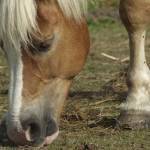Geophagia: Eating Dirt Could Have Several Explanations

Many horses brush the ground with their lips, even licking or biting up chunks of dirt. Seeing this behavior, some owners assume their horses are lacking in dietary minerals. These owners worry that they aren’t providing adequate nourishment, and they also fear that their horses will suffer digestive upsets or blockages from eating dirt and sand.
While the behavior is not uncommon in both domestic and feral horses, the cause of geophagia (eating dirt) often can’t be easily explained. Some horses are more interested than others in eating dirt, even when the whole herd is grazing the same pasture and consuming the same type of concentrate. This indicates that geophagia is somewhat of an individual preference and does not always indicate a mineral deficiency. However, as with any other change in behavior, owners should pay attention if their horses suddenly begin to eat dirt or increase the amount of dirt they are consuming.
According to Dr. Kathleen Crandell, an equine nutritionist with Kentucky Equine Research, an increase in geophagia may be partly a reaction to other changes in the horse’s routine or management. She offered these possible explanations to an owner whose horse had begun eating dirt and licking metal hitching rails after moving to a new boarding farm.
- “If you are noticing a definite increase in dirt consumption with the move to a new facility, there could be several reasons. If you are feeding the recommended amount of a fortified commercial product, it does not seem as though your horse should be suffering a mineral deficiency problem. Therefore, adding more minerals may not take care of the concern.”
- “Your horse is now on an all-pelleted diet, but you didn’t mention whether she had been on a similar diet before coming to the current facility. If this is the first time she has been given pelleted hay, she may need an adaptation period to get used to the change in the amount of time it takes to finish her meals. Hay consumption takes an average of 8 hours a day, while pelleted hay consumption can be as little as two hours a day. That leaves a lot of free time, and it is not uncommon for horses in this situation to acquire curious behaviors. Providing increased exercise and companionship may be helpful in decreasing boredom as well as behaviors like dirt consumption.”
- “Licking metal surfaces can result from boredom, or the horses may simply like the metallic (iron) taste. Sometimes they are licking the salty taste of sweat from another individual that rubbed up against the rail.”
- “Feral horses that eat dirt are thought to be seeking highly saline spots to meet their requirement for salt. Since you are offering free choice salt, this is probably not the case with your horse. Be sure your salt block has not been contaminated with feces or anything else that may make it unpalatable.”
- “Horses that suffer from ulcers are occasionally seen seeking dirt. Perhaps the dirt soothes the stomach, but there really is no substantial research on this phenomenon. Your horse’s recent change of environment may have been enough to bring about an episode of gastric ulcers.”
- “There has been a report that correlated severe intestinal parasitism with purposefully eating dirt. With the dewormers we have available today, this would rarely be a problem.”
- “Because your horse is now in an area with somewhat sandy soils, there is reason to be concerned about sand colic. Getting veterinary advice on recommended methods for effective sand removal would be advised.”








